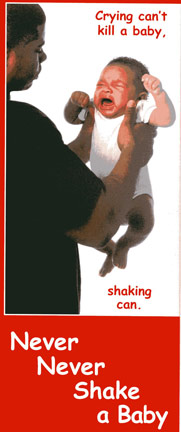Shaken
Baby Syndrome
And why prevention is important:
by Harshani A. Pinnawala
 What happens when parents and caregivers lose control of themselves
while putting a child to sleep or shaking them to stop them from crying
or throwing them about during an emotional outburst? What happens when parents and caregivers lose control of themselves
while putting a child to sleep or shaking them to stop them from crying
or throwing them about during an emotional outburst?
These actions of a few seconds might lead to bruises, bone fractures
and significantly, a permanent health issue identified as Shaken Baby
Syndrome (SBS). Infants who are below 1 year are more prone to this
syndrome, although this can be seen in children up to the age of 5 years
as well.
The term may vary due to the method of SBS such as abusive head
trauma, shaken impact syndrome, whiplash shake syndrome and inflicted
head injury. However, this is a traumatic injury occurring to the brain
of an infant or toddler due to abuse.
Infants suffering from SBS have heads larger than the rest of their
body, and their neck muscles are comparatively weak, which makes it
difficult to support their heads. Aggressive shaking of infants also
causes serious damages to the brain tissues.
Symptoms:
Symptoms of SBS might commence within several days (2-3) in a badly
injured infant, or may not be immediately visible. These symptoms might
vary due to age, number and length of abusive episodes and the degree of
force used.
Mild injuries may cause subtle symptoms such as being fussy, rigid,
glassy eyes, unable to lift the head, or focus on an object, lethargy,
and extreme irritability, difficulty in staying awake, body tremors,
breathing difficulties, discoloured skin, vomiting, poor eating habits
and problems in feeding.
The long term consequences of infants who are exposed to SBS and
harsh injuries are severe damages occurring in the brain, which might
lead to eye damage such as bleeding inside the eyes and or complete
blindness, hearing impairment, speech problems, damage to the neck and
spinal cord, learning disabilities (issues related to understanding or
using spoken or written language), intellectual disability (difficulties
in learning to talk and or not being able to take care of themselves in
later years), emotional setbacks, behavioural problems, paralysis
(permanent vegetative state), developmental problems, seizures (rapid
abnormal electrical activities in the brain), slow heartbeat and
cerebral palsy (awkward movements due to muscle stiffness).
Treatment:
In most severe cases, this might lead to a coma situation
(unconsciousness) due to the severity of the brain injury, even
resulting in permanent loss of lives.
Is SBS curable? The answer is definitely 'no'. Moreover, on a
negative note for this syndrome, SBS cannot be discovered if the
symptoms are mild. It might even be misinterpreted as an infection or
normal fever or kidney problem.
However, once a diagnosed infant is hospitalised, the medical
trainers might use various techniques to lower the damage such as
dispensing medicine to reduce brain swelling, providing cooling
mattresses to lower the body temperature and reduce brain swelling and
oxygen therapy to increase the breathing.
Prevention:
To discover the irreversible injuries in the brain, an infant might
need to be subjected to various tests such as computerised tomography
(CT), scan magnetic resonance imaging (MRI), skeletal survey
ophthalmological exam and blood tests.
A diagnosed infant might need to undergo brain surgery and be put on
lifelong medical care for hearing difficulties, development delays,
learning problems, seizures, coma and cerebral palsy.
Additionally, a child may seek help from counsellors or psychologists
for a period of time to overcome the traumatic events, which will again
have an impact while exploring the history.
The probability of increasing the risk factors occurring in SBS are
mostly related to parents and caregivers. Young and single parenthood,
domestic violence, consumption of alcohol, unstable family situations,
unrealistic expectations of children, street levels, depression and
other psychological problems can be the reasons for mistreating
children.
As an example, if one or both parents are exposed to mistreatment as
a child, there is a tendency for repeating the same to his/her child.
This can be seen in men than in women.
Nevertheless, SBS can be prevented by following certain precautions
such as not leaving children with unknown caregivers, and if this cannot
be avoided, make them aware about the severity of SBS.Furthermore, it is
better to leave the child behind for a period time, if the parents are
not in a situation to control their anger while feeding or putting to
sleep.
Parents who are at a risk of harming their child need to seek help
from counsellors/psychologists.
Parents or the caregivers need to protect their children. For, once
the SBS occurs, the damage is done forever. |

